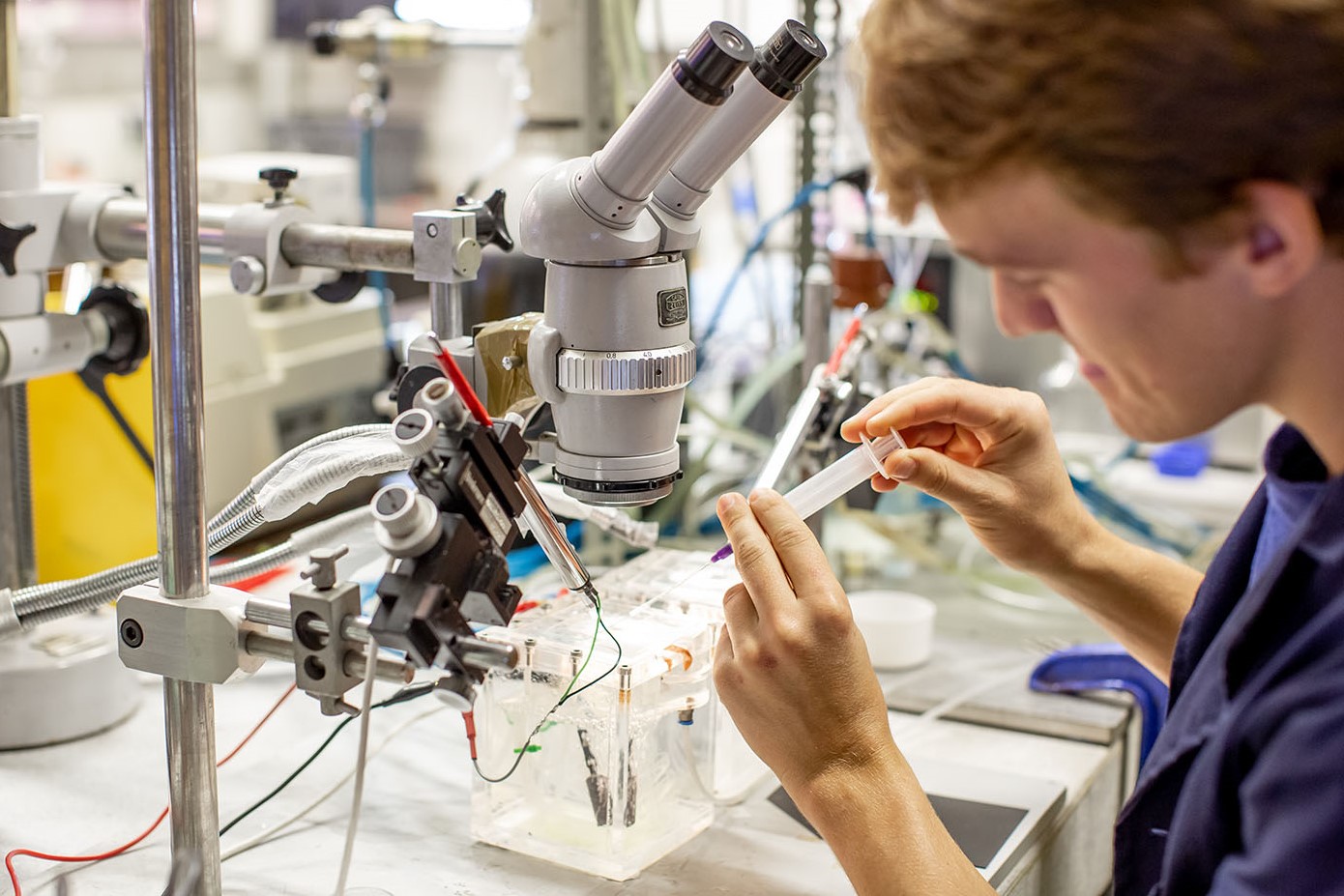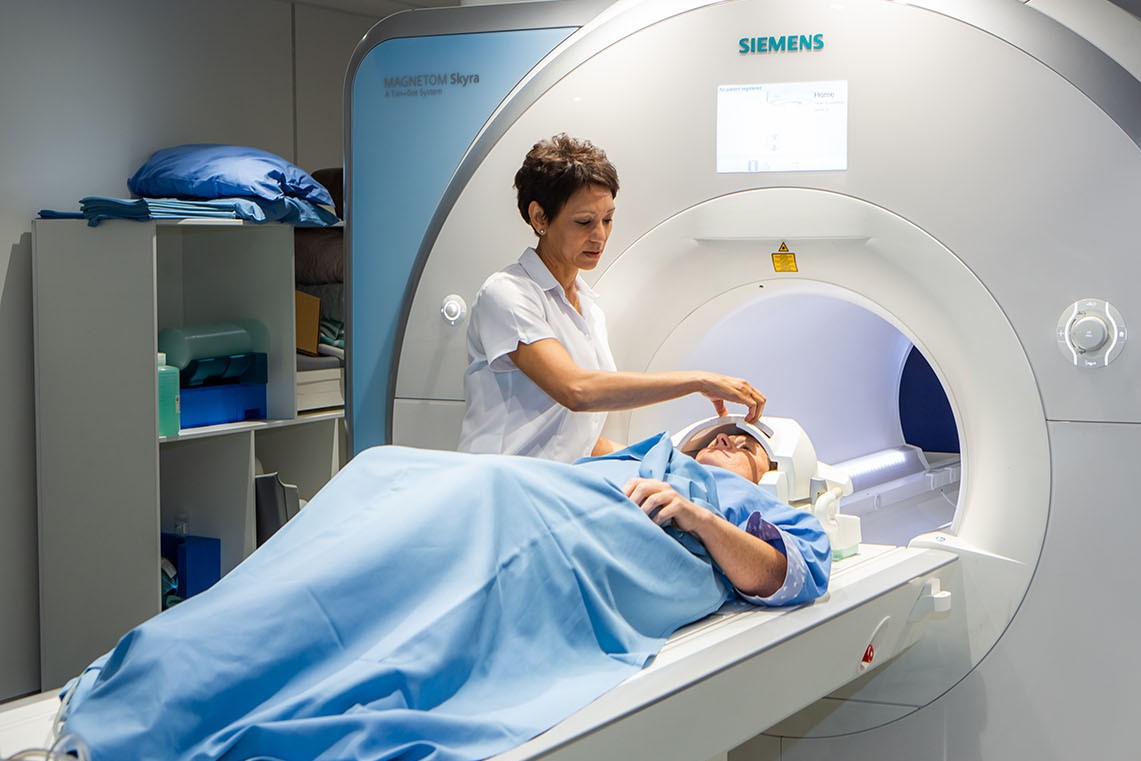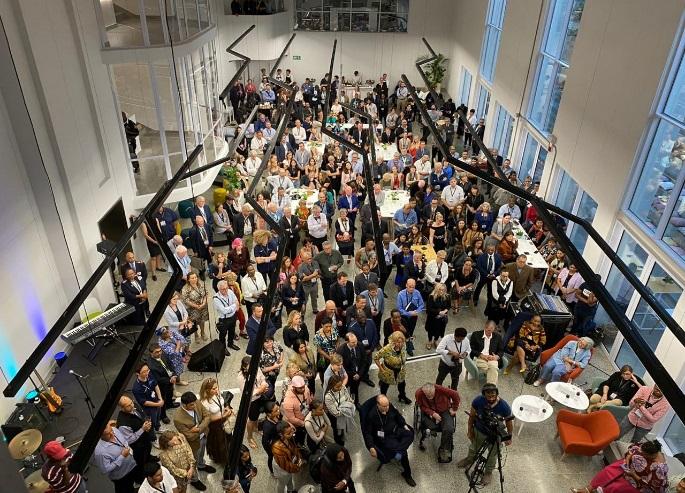Launched in March 2020, our Neuroscience Institute is the first of its kind in Africa, and boasts state-of-the-art technology and facilities that allow our interdisciplinary team to to integrate and improve patient care, research, teaching and training, and advocacy.
The facility is shared between Groote Schuur Hospital and UCT, and provides both clinical and academic space. Interaction and collaboration is encouraged through numerous shared spaces, and innovation is stimulated through facilities such as multidisciplinary clinics, technology-enabled meeting venues, innovation laboratories for testing, training and translational neuroscience, and a neuroinformatics hub.
 Neuroscience Laboratory
Neuroscience Laboratory
We have a core laboratory to foster current and future clinical and basic neuroscience projects.
The laboratory facilitates key areas of research including biomarker discovery, molecular biology and cell culture work, and drug research and discovery, and comprises four areas:
- a designated isolation room for DNA and RNA extraction for downstream whole transcriptome, whole genome and single cell sequencing
- a contained bio-safety level II room for work with biohazardous samples, including those from patients with tuberculosis and HIV
- a cell culture lab to facilitate cutting edge work on brain slice, dermal and neuronal cell cultures
- a general lab for multiplex protein analysis, developing in-vitro drug recovery models and general sample processing.
We are also raising funds for a biobank that can serve as a key repository for unique clinical neuroscience specimens collected at both Groote Schuur Hospital and Red Cross War Memorial Children's Hospital, and that has the scope to be not only a rich local and national resource, but also a continental one.
Innovation Laboratory
While largely under control of neurosurgery, this space is also used for teaching neuroanatomy to all disciplines, in partnership with the Division of Human Anatomy. This has been divided into a wet lab for human tissue work, and a dry lab for electronic simulation.
The wet lab is equipped with 5 Karl Storz© endoscopic workstations and space to simulate an operating theatre, with adjacent freezer room for anatomical specimens and a capacious sluice room, while the dry lab has a 3D display (Alioscopy©) together with screens for reviewing cases and using surgical planning software such as BrainLab©. Both labs are equipped with state-of-the-art videoconferencing capacity, enabling teaching to take place in partnership with colleagues anywhere in the world.
The initial infrastructure was installed with a donation from the Gabriel Foundation.
Neuroinformatics Hub
The Neuroinformatics Hub is being developed in collaboration with the Faculty Bioinformatics Group. The Networking Neuroscience in Africa (NN) initiative represents a plan to establish a comprehensive data accessibility, management and integration platform, aiming to provide support for storage, management and analysis of data across basic and clinical neuroscience research based at the

Neuroscience Institute. Different data types have different custodians, for example researchers create cohorts of participants for specific projects, for which they may collect phenotype data, including neuroimaging (MRI and PET-CT) or biomedical data, whole genome data and RNAseq data.
It is critical that datasets are associated with descriptive metadata which can be mapped among identifiers to enable integration across different components. A shared taxonomy is essential in order to effectively curate data and define applicable language for knowledge representation, allowing for interoperability of content and data.
The NN platform will facilitate interface between data-types bringing together disciplines including neurology, neurodevelopment, neurosurgery, psychiatry, neuropsychology neuroimaging and basic/molecular neuroscience.
This resource can lead to significant cross-collaboration with other research entities at UCT and new opportunities for scholarship at the intersection of communicable and non-communicable disorders of the nervous system. Groupings include Institute of Infectious Disease and Molecular Medicine (IDM), Wellcome Centre for Infectious Diseases Research (CIDRI-Africa) and regionally, the Human Heredity and Health Africa (H3Africa) consortium.
CUBIC

The Cape Universities Body Imaging Centre (CUBIC), situated adjacent to the Neuroscience Institute, is a joint initiative between Siemens, Stellenbosch University, UCT and the MRC. The core focus of the centre is collaborative imaging research and technical support is provided by the Imaging Science research group based in the Neuroscience Institute. CUBIC houses state-of-the-art research-dedicated large bore Siemens 3T Skyra MRI and Biograph mCT Flow 64 PET-CT scanners.
Most recently, a clinical brain-computer interface system was purchased that will be used in stroke rehabilitation research. Other than the imaging equipment, the centre has network facilities, consultation rooms, common working areas, and in the PET-CT suite, injection rooms, a cooling room and a hot lab. Three MR physicists, three MR radiographers, two nuclear medicine radiographers, a nuclear medicine physician, an administrator and a business manager are employed full time. At any time, there are roughly 30 active research projects being conducted at CUBIC, most of which focus on addressing diseases or conditions that present major public health problems to South Africa, including HIV, Fetal Alcohol Syndrome, drug abuse, trauma, and mental health.
Clinical space
The building has 15 rooms available for clinical use, including consulting rooms, examination rooms, an MDT room and procedure room.
 Atrium and Auditorium
Atrium and Auditorium
The main purpose of the Neuroscience Institute is to encourage connections to be made between people and disciplines, and nothing epitomises that better than the Atrium, a gorgeous, welcoming space that invites conversations. Alongside it is the 120-seat auditorium. These two venues function seamlessly together, and when linked with an additional theatre complex, can accommodate up to 600 people.
Meeting spaces
We have a number of boardrooms, all equipped for video conferencing.
Quiet spaces
We have a number of quiet spaces for reflection, both inside and outside the building, which is surrounded by an indigenous fynbos garden.
We wish to acknowledge the crucial role of philanthropy, in particular the support of David and Ursel Barnes, in augmenting the high-level support provided by UCT in partnership with the Western Cape Provincial Government to make this institute possible.
